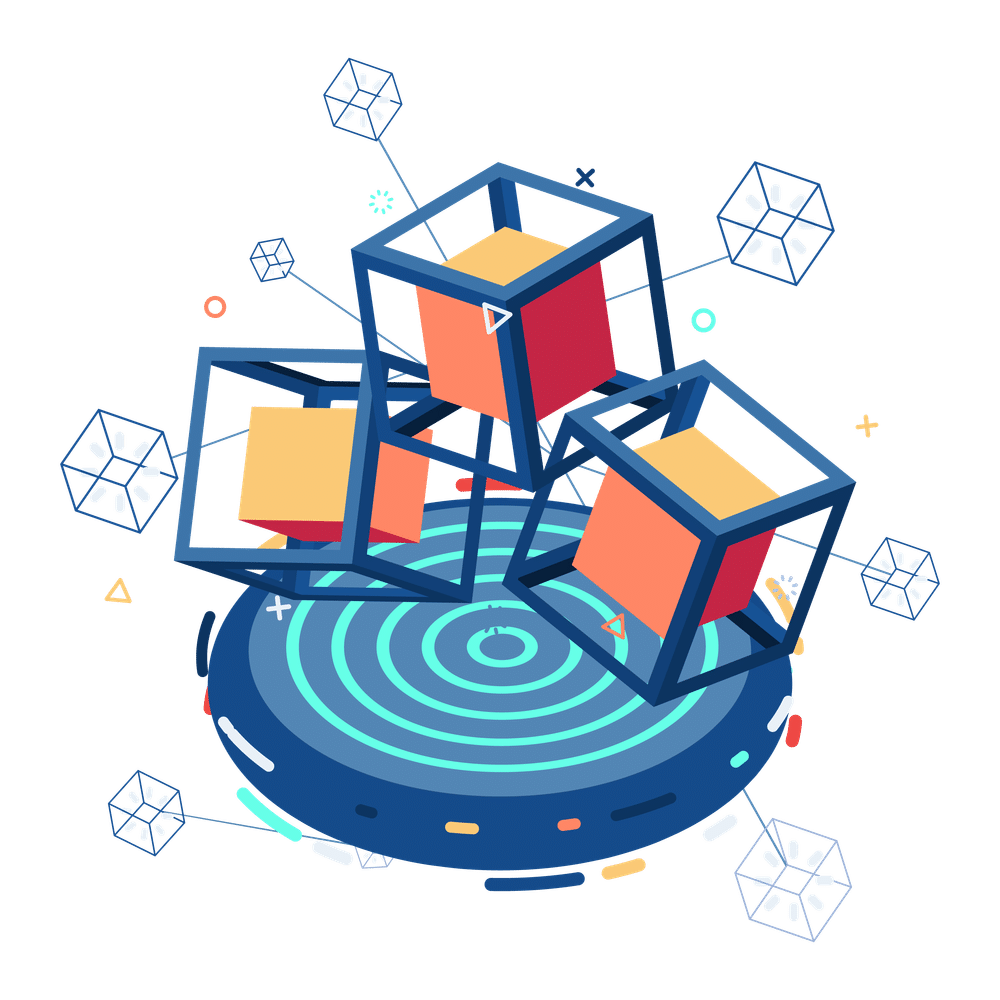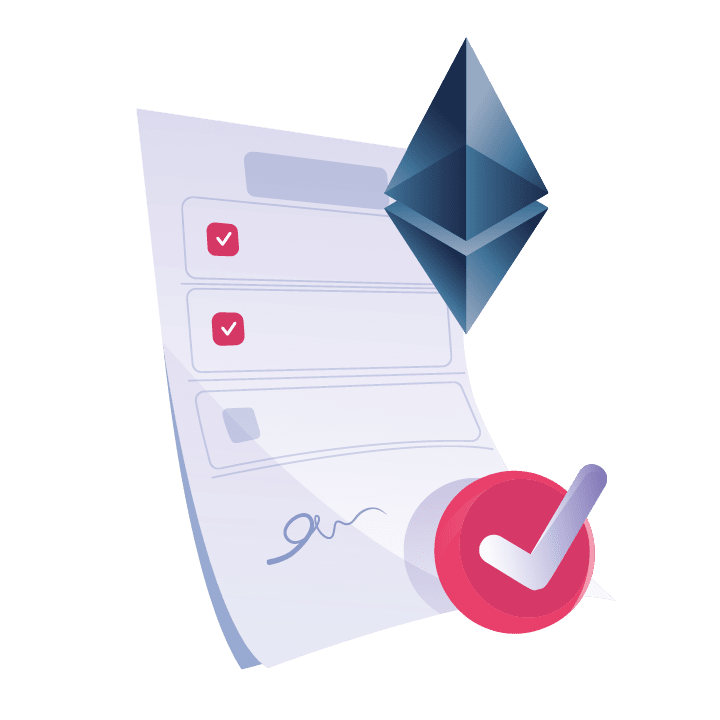
We are your Blockchain development company in Mexico.
Blockchain development and decentralized applications
Are you looking for a company to develop your Blockchain project in Mexico? We are experts in the development of Web3 platforms with +5 years of experience. We create decentralized applications on networks such as Ethereum, BNB Chain and Arbitrum.







What is a Blockchain dapp?
A DApp, or Decentralized Application, is a type of application that operates over a blockchain infrastructure, standing out for its decentralized nature and its execution through smart contracts. Unlike conventional applications, DApps do not rely on a central server, but instead leverage the distributed logging technology of the blockchain. For example, Uniswap is a decentralized exchange (DEX) that allows users to exchange ERC-20 tokens without the need for an intermediary. It operates through smart contracts and uses an automated liquidity model.
Our Blockchain Development Services in Mexico
We take care of creating your project from scratch through a strategic and technological approach.
RWA Tokenization
We develop the necessary infrastructure for the tokenization of real assets (RWA) for real estate, intellectual property...
dApps Development
We create custom decentralized applications, with a unique UX/UI and an efficient Smart Contracts architecture.
Blockchain Consulting
Specialized advice with our experts to start your project based on Blockchain technology.
NFT Marketplace
It digitally represents your assets or certificates through non-fungible tokens, providing security to your customers.
Smart Contracts Audit
Ensure the security and transparency of your platform's smart contracts with our specialized audits.
Smart Contracts Development
We develop Smart Contracts on EVM networks (Ethereum, Polygon, BNB Chain, Arbitrum) with Solidity and on the Solana network with rust.

Development of Smart Contracts in Mexico
A Smart Contract is a stand-alone computer program that automatically executes and verifies the terms of an agreement when certain predefined conditions are met. These contracts are written in code and reside on the blockchain, allowing them to be executed transparently and securely without the need for intermediaries.
At Metlabs, we specialize in the development of Smart Contracts for various blockchain platforms (EVM), such as Ethereum, Binance Smart Chain and Arbitrum. Our team of expert programmers uses specific smart contract languages, such as Solidity, to translate the terms of the agreement into executable code.
Develop your dapp in Mexico with Metlabs
At Metlabs, we are proud to be your reliable partner in the journey of developing Decentralized Applications (DApps) in Mexico. If you have an innovative vision and are looking to bring it to digital reality, we are here to turn your ideas into a successful DApp, transforming the way you transmit value on the blockchain.
Our team of developers will work on the custom development of your DApp, ensuring that it aligns perfectly with your specific goals and requirements.

Most common questions about Blockchain development in Mexico
Metlabs operates in a completely remote environment, which allows us to work with clients throughout Mexico without geographical restrictions. Throughout our trajectory, we have had the privilege of developing successful projects for clients in diverse areas of the country, including, but not limited to, major cities such as Mexico City, Guadalajara, Monterrey, Puebla and Queretaro. Our remote work structure allows us to adapt to the individual needs of our clients in any region of Mexico, facilitating effective collaboration regardless of geographic location. We are proud to have contributed to the digital growth of several companies and entrepreneurs across the country, bringing innovation and excellence in DApps development to every corner of Mexico.
Creating a blockchain-based application involves several steps from planning to implementation and maintenance. Here is a summary of the process:
- Definition of Purpose and Objectives:
- Identify the need or problem that the blockchain application will solve.
- Establish clear and measurable objectives that are expected to be achieved with the application.
- Choice of Blockchain Platform:
- Select the blockchain platform that best suits the project requirements (Ethereum, Hyperledger Fabric, Binance Smart Chain, etc.).
- Architectural Design:
- Create an architectural design that defines the structure and components of the application.
- Decide whether the application will be public or private and define the nodes and participants.
- Development of Smart Contracts:
- Codify the smart contracts that will define the application logic and business rules.
- Use programming languages specific to the chosen blockchain platform (Solidity for Ethereum, for example).
- Front-end and Back-end development:
- Create the front-end of the application for user interaction.
- Develop the back-end to manage application logic that is not on the blockchain.
- Blockchain integration:
- Connect the front-end and back-end to the blockchain via APIs and web services.
- Ensure the security and integrity of transactions.
- User Interface (UI) development:
- Design an intuitive and attractive user interface for easy user interaction with the application.
- Tests:
- Perform extensive testing to ensure the correct functioning of the application and the security of smart contracts.
- Implementation and Deployment:
- Carry out the implementation and deployment of the application on the selected blockchain network.
- Monitoring and Maintenance:
- Establish a monitoring system to ensure continuous performance and detection of potential problems.
- Provide regular maintenance, updates and upgrades as needed.
This process is iterative, with continuous adjustments and improvements as feedback is obtained and the application evolves. Close collaboration between developers, blockchain specialists and stakeholders is essential to the success of the project.
A smart contract is a stand-alone computer program that automatically executes, validates or facilitates the execution of a contract when certain predefined conditions are met. These contracts are executed on a blockchain, usually on platforms such as Ethereum, Binance Smart Chain, or EOS. Here I explain the basics of what a smart contract is and how it is programmed:
What is a Smart Contract?
- Executable Code:
- A smart contract is a set of executable code stored on the blockchain.
- It is used to automate and automatically execute agreements and transactions without the need for intermediaries.
- Conditions of Execution:
- Smart contracts contain logical (if-then) conditions that determine their execution.
- For example, a contract may transfer funds to a recipient if certain conditions are met.
- Transparency and Security:
- Being on the blockchain, smart contracts are transparent, immutable and secure.
- Anyone can review the code and associated transactions.
Creating a DApp (decentralized application) from a Figma design involves several steps. Figma is a design tool that allows you to create prototypes of user interfaces. Here is a basic guide on how you might approach this process:
1. Understanding Design:
- Analyzes the design in Figma to understand the structure of the user interface, interactive elements and user flows.
2. Structure of the DApp:
- Decide on the architecture and structure of your DApp. Define the pages and components based on Figma's design.
3. Choice of Blockchain Platform:
- Select the blockchain platform on which you want to build your DApp (e.g. Ethereum, Binance Smart Chain, etc.).
4. Front-end development:
- Use Figma's design as a guide to develop the front-end of the DApp.
- Convert design elements into code using standard web technologies such as HTML, CSS, JavaScript, and use libraries or frameworks if necessary.
5. Integration with Blockchain:
- Implements blockchain logic on the front-end using libraries and tools specific to the selected platform.
- It connects the DApp to the blockchain network via service providers such as MetaMask.
6. Development of Smart Contracts:
- If your DApp includes custom smart contracts, program these contracts using a language compatible with the blockchain platform (e.g. Solidity for Ethereum).
Latest publications on Blockchain Technology and Development in Mexico


Optimistic Rollups: the Future of dApps








